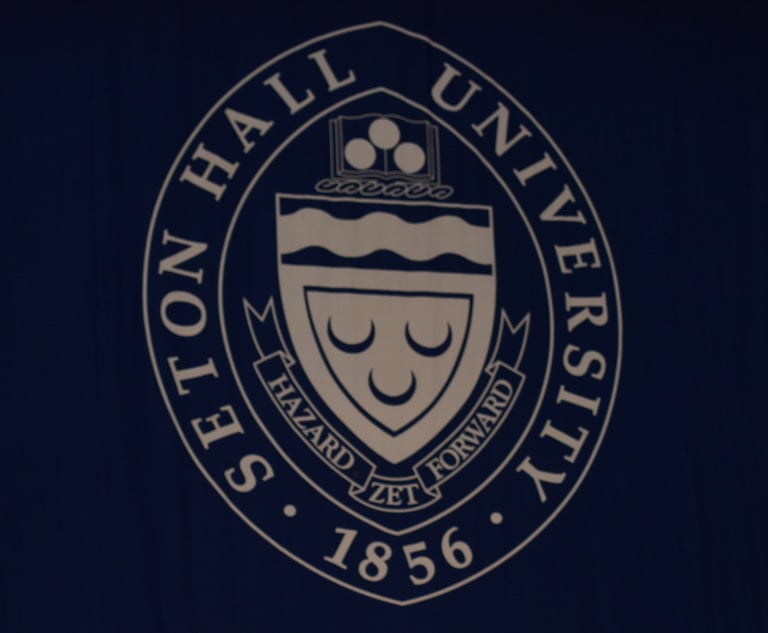
Proposed Law School Accreditation Standard of Free Speech and Disruptive Behavior Is Needed
Public discourse in this country is currently in a state of woeful dysfunction. If there is to be any hope of a return to norms of civilized and reasoned disagreement, the legal profession may have a special role in its recovery.
September 03, 2023 at 10:00 AM
4 minute read
The American Bar Association is currently considering adoption of a new accreditation standard on academic freedom and freedom of expression that would require all accredited law schools to adopt a policy that (1) protects the rights of faculty, students, and staff to communicate ideas that may be controversial or unpopular, and also (2) proscribes disruptive conduct that hinders free expression by preventing or substantially interfering with the carrying out of law school functions or approved activities.
It is particularly interesting to note that this proposed accreditation standard would require a law school to adopt rules both protecting the communication of controversial or unpopular idea, while at the same time proscribing disruptive conduct. These two goals are not inconsistent with each other. It is true that in the past, vaguely worded policies trying to prohibit so called "hate speech" on university campuses may have been misused to censor unpopular or controversial ideas. But the proposed ABA policy correctly notes that there is a difference between speech that is disruptive and speech that is controversial. If this proposed standard is adopted, it may fall to law schools to show to the other disciplines in higher education how this distinction is drawn.
The need for the proscriptive rule against disruption has unfortunately been made clear by recent events. A widely reported incident at Stanford Law School at which law students heckled conservative Fifth Circuit Judge Kyle Duncan, effectively preventing his planned lecture, demonstrates that clear and viewpoint neutral distinctions can and must be made between disruptive behavior and protected controversial speech. The legal argument of the disruptors that their attempt to exercise a heckler's veto was itself protected expression is frankly so absurd as to be unworthy of substantive rebuttal.
This content has been archived. It is available through our partners, LexisNexis® and Bloomberg Law.
To view this content, please continue to their sites.
Not a Lexis Subscriber?
Subscribe Now
Not a Bloomberg Law Subscriber?
Subscribe Now
NOT FOR REPRINT
© 2025 ALM Global, LLC, All Rights Reserved. Request academic re-use from www.copyright.com. All other uses, submit a request to [email protected]. For more information visit Asset & Logo Licensing.
You Might Like
View All

Don't Let Your Summer Associates Burn Out—Mentorship Advice for a Lasting Impact
4 minute read
$1.3M Stolen From Seton Hall Law School: Ex-Assistant Dean Pleads Guilty
5 minute read
Trending Stories
Who Got The Work
Michael G. Bongiorno, Andrew Scott Dulberg and Elizabeth E. Driscoll from Wilmer Cutler Pickering Hale and Dorr have stepped in to represent Symbotic Inc., an A.I.-enabled technology platform that focuses on increasing supply chain efficiency, and other defendants in a pending shareholder derivative lawsuit. The case, filed Oct. 2 in Massachusetts District Court by the Brown Law Firm on behalf of Stephen Austen, accuses certain officers and directors of misleading investors in regard to Symbotic's potential for margin growth by failing to disclose that the company was not equipped to timely deploy its systems or manage expenses through project delays. The case, assigned to U.S. District Judge Nathaniel M. Gorton, is 1:24-cv-12522, Austen v. Cohen et al.
Who Got The Work
Edmund Polubinski and Marie Killmond of Davis Polk & Wardwell have entered appearances for data platform software development company MongoDB and other defendants in a pending shareholder derivative lawsuit. The action, filed Oct. 7 in New York Southern District Court by the Brown Law Firm, accuses the company's directors and/or officers of falsely expressing confidence in the company’s restructuring of its sales incentive plan and downplaying the severity of decreases in its upfront commitments. The case is 1:24-cv-07594, Roy v. Ittycheria et al.
Who Got The Work
Amy O. Bruchs and Kurt F. Ellison of Michael Best & Friedrich have entered appearances for Epic Systems Corp. in a pending employment discrimination lawsuit. The suit was filed Sept. 7 in Wisconsin Western District Court by Levine Eisberner LLC and Siri & Glimstad on behalf of a project manager who claims that he was wrongfully terminated after applying for a religious exemption to the defendant's COVID-19 vaccine mandate. The case, assigned to U.S. Magistrate Judge Anita Marie Boor, is 3:24-cv-00630, Secker, Nathan v. Epic Systems Corporation.
Who Got The Work
David X. Sullivan, Thomas J. Finn and Gregory A. Hall from McCarter & English have entered appearances for Sunrun Installation Services in a pending civil rights lawsuit. The complaint was filed Sept. 4 in Connecticut District Court by attorney Robert M. Berke on behalf of former employee George Edward Steins, who was arrested and charged with employing an unregistered home improvement salesperson. The complaint alleges that had Sunrun informed the Connecticut Department of Consumer Protection that the plaintiff's employment had ended in 2017 and that he no longer held Sunrun's home improvement contractor license, he would not have been hit with charges, which were dismissed in May 2024. The case, assigned to U.S. District Judge Jeffrey A. Meyer, is 3:24-cv-01423, Steins v. Sunrun, Inc. et al.
Who Got The Work
Greenberg Traurig shareholder Joshua L. Raskin has entered an appearance for boohoo.com UK Ltd. in a pending patent infringement lawsuit. The suit, filed Sept. 3 in Texas Eastern District Court by Rozier Hardt McDonough on behalf of Alto Dynamics, asserts five patents related to an online shopping platform. The case, assigned to U.S. District Judge Rodney Gilstrap, is 2:24-cv-00719, Alto Dynamics, LLC v. boohoo.com UK Limited.
Featured Firms
Law Offices of Gary Martin Hays & Associates, P.C.
(470) 294-1674
Law Offices of Mark E. Salomone
(857) 444-6468
Smith & Hassler
(713) 739-1250






